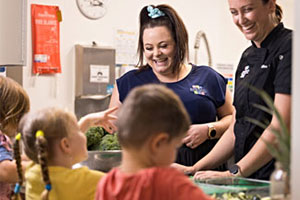 As an educator you need to be on your toes when watching, listening to and interacting with children of all ages.
As an educator you need to be on your toes when watching, listening to and interacting with children of all ages.
Inadequate supervision often causes, or contributes to, serious incidents at early childhood services, whether it’s during indoor or outdoor playtime, routines, transitions, excursions or on a bus.
Director of Hervey Bay’s Brady Bunch Early Learning Centre, Ebony Dowdle, said it’s important to mentor educators so they understand the key priorities of supervision.
'We have our beautiful mango tree outside and that requires somebody to be present and actively involved.
Whereas there are different activities that the children may be able to do with more autonomy and without quite as much involvement from their educators.
So it's a bit of professional development and training around what the different levels of supervision mean and how to actively and effectively supervise based on those different levels.’
Educator Monique Viljoen said the team set up provocations and learning experiences according to the children's needs, what their interests are, what would engage them more and keep them more focused.
‘I.e., in the mornings, when our children tend to be a little bit more unsettled, we will plan activities that require close supervision from educators, which in turn, then helps the children to settle easier,’ Monique said.
Watch more tips on supervision—transcript—from the team at Brady Bunch Early Learning Centre.